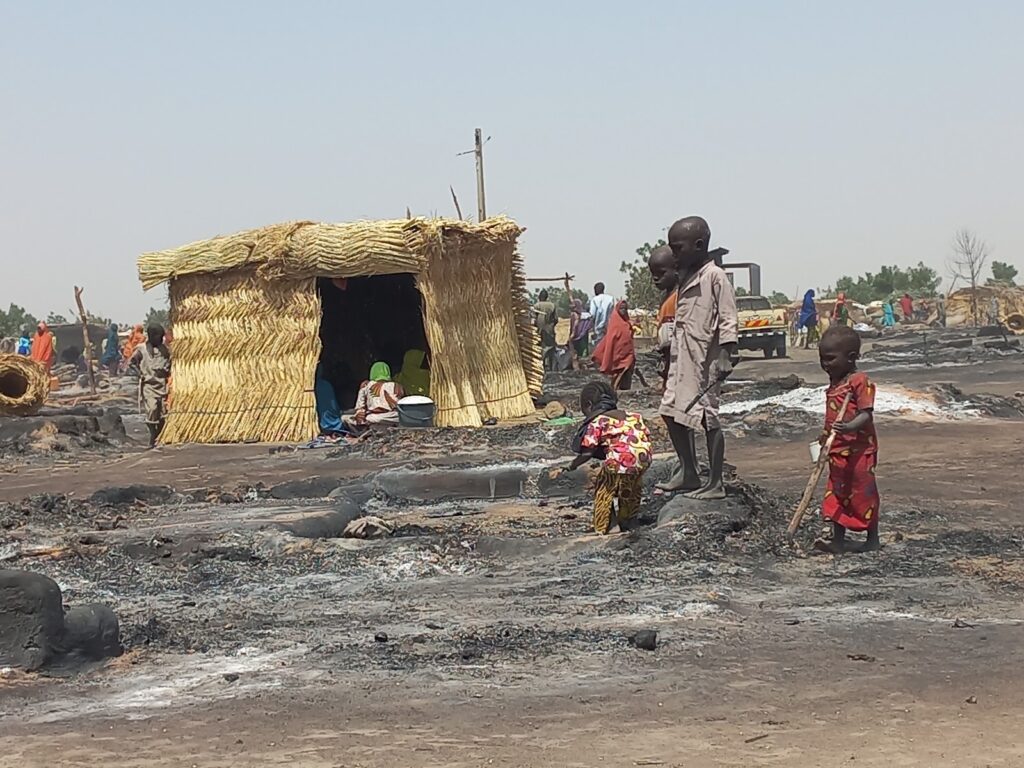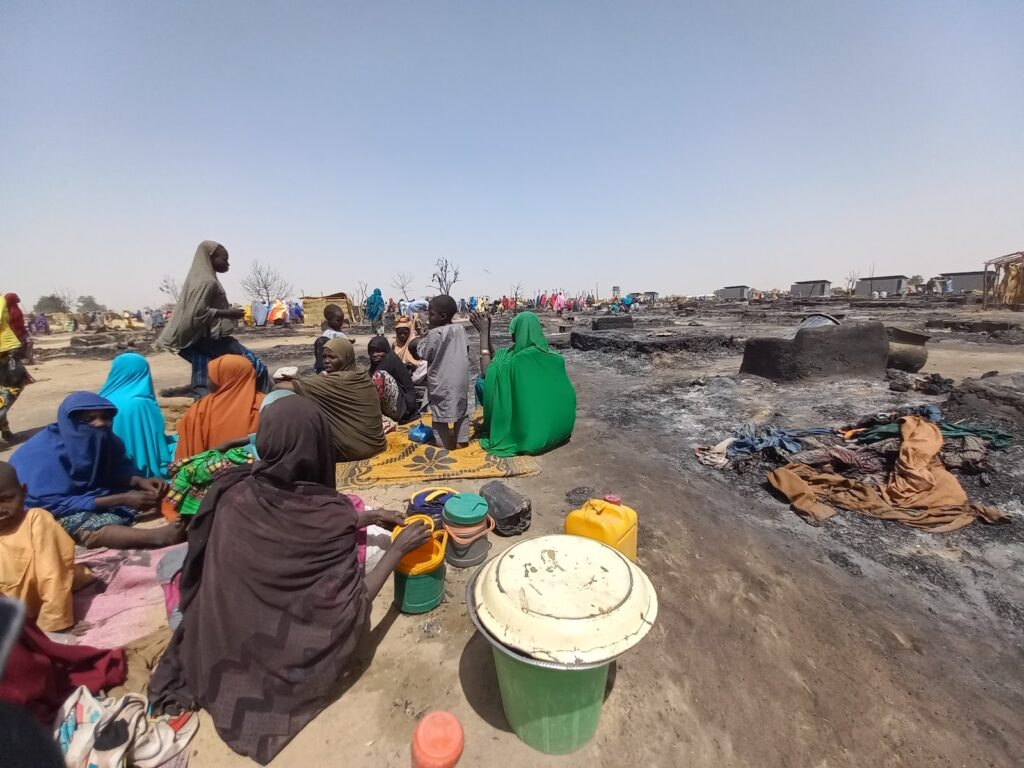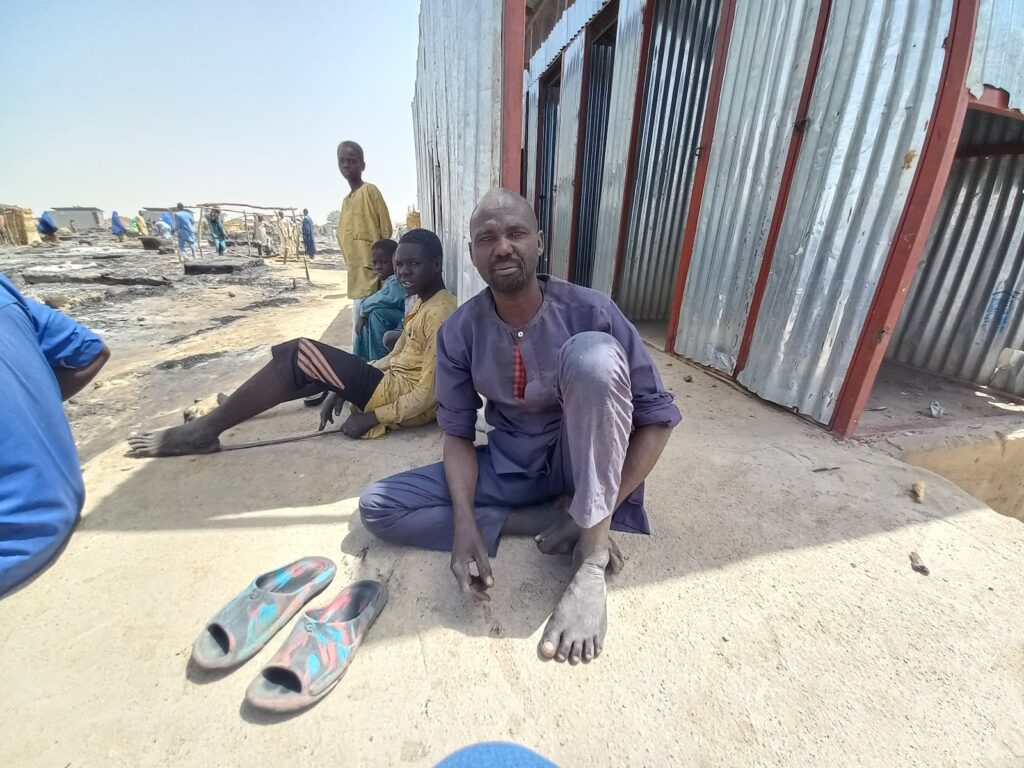Muna Camp Fire: Nigerian IDPs Count Losses Amid Worsening Vulnerabilities
IDPs have continued to be at the receiving end of the recurring fire disasters in camps around Borno State.

A fire that consumed the shelter of Garba Isa, 53, on the afternoon of Friday, Feb. 28, did not only render him and his large household homeless. According to him, he also lost all that he hoped to start a new life with when he finally returned to Mafa, his hometown, in Borno, Northeast Nigeria.
The outbreak had affected parts of the Muna Albadawi camp in Maiduguri, rendering over 3,000 internally displaced people homeless.
Muna Albadawi is the largest host community camp in Borno, whose 51,000 residents were recently profiled by the state government for a return to their respective local government areas. The camp is expected to be closed as soon as the profiled IDPs are given the usual cash and food support to take home.
Muna Camp had suffered several fire disasters in the last two years as authorities failed to act on calls for a lasting solution.
The atmosphere was gloomy on Saturday morning when HumAngle visited the camp. Smoke from scorched woods and clothing continued to choke the air as some of the dwellers who could not bear another night of sleeping outdoors tried to rebuild their shelters.

Children scavenge for valuables from the charred remains of their burnt homes. Photo credit: Abdulkareem./HumAngle
Women and children, all wearing long faces, stood around the spots their tents once stood, their whitened skins and dried lips suggesting they had slept out in the open the previous night.
Garba and his older brother sat around the debris of burnt metal carcasses that used to be his hard-earned assets. In the heap were a five horsepower pumping machine, two sewing machines, a bicycle, and a cart.
“I bought the pumping machine from the sales of grains that I cultivated at the nearby safe farming centre so that I can use it to start my usual irrigation farming when we finally go home,” he said with a dry smile.
“The two burnt sewing machines that you see here belonged to my sons who have trained as tailors and want to open a shop when we return home. Now all is gone and we are left with nothing.”
Garba, who has three wives and 18 children, said he used to grow pepper and tomatoes in Mafa before he was forced to flee to Maiduguri about six years ago due to the Boko Haram insurgency.
“I lost all my belongings, including my farming implements during the attack on Mafa. That’s why we had to work hard to raise money to buy all these, but they have all gone in the fire,” he said.
In another section of the camp, 34 years old IDP Hauwa Ali sat near her burnt home with her aged mother. Nothing around her, except for the pile of ashes, showed that a building once existed there.

Women sitting in a general state of despair hours after their homes at Muna Albadawi Camp in Maiduguri were gutted by fire. Photo credit: Abdulkareem/HumAngle
“I was taking a nap inside our hut when my daughter came running, screaming that fire was burning homes from the northern part of the camp. It was coming so fast that I had to only help my mother out as quickly as possible. We managed to escape to safety without picking anything from the house,” Hauwa said.
“All our belongings have been burnt in the fire, including our clothes and food items. We have nothing left except the clothes we have on. I’m confused here and don’t know what to do, because we slept out in the open cold on a bare floor last night.”
She added that she had also lost the food and cash card she got from the state government ahead of the camp’s scheduled closure.
“This suffering is too much for us to bear; this is the second time and we are tired. They should allow us to go home. I am from Agatti village in Mafa Local Government Area. It is better than being here and getting killed by a fire disaster.
“Three persons died in the fire yesterday, one of them was a child and it’s so painful seeing a child being burnt alive in a fire,” she said in tears.

Bukar Usman, an IDP, seeks shade beside a dilapidated toilet at Muna Camp a day after losing all his belongings to a fire. Photo credit: Abdulkareem/HumAngle
Bukar Mustafa, 49, and a father of eight, told HumAngle his family had to sleep in the cold on empty stomachs and without covering.
“My worst pain is that I have lost my savings from the little sale of our farm produce,” he said.
“The fire started at about the time most of the Muslim males in the camp had gone for the Friday Congressional prayers,” Bukar said. “Only the women were left at the time of the outbreak. We had to start running back to the camp from the mosque. But it was long too late at the time we arrived. I thought I could arrive faster to save some of our belongings, including my little savings, but I saw everything in my home razed down.
Government plans for victims
State officials, led by Governor Babagana Zulum and the Director-General of the State Emergency Management Agency (SEMA), visited the camp on Saturday, disclosing that about 3,000 homes were affected, causing 12,000 IDPs to be homeless.
“It was an emotional moment even for the officials of the emergency humanitarian agency because the fire had caused a massive destruction,” said Head of SEMA, Yabawa Kolo.
“The Muna Albadawi camp is divided into seven zones and the burnt section is zone-A which has over 3000 shelters,” she said.
The governor who briefly addressed the victims of the disaster expressed sympathy while also stressing the need to “decongest the camp”.
He said though the Muna Albadawi camp is not one of the official camps recognised by the government, “their large population cannot be ignored; that was why the government earlier profiled them to return them to their original homes in a safe and dignified manner.”
For now, the authorities promised, the affected IDPs’ immediate needs, including shelter, food and clothing, would be addressed as the government works on “moving them to somewhere more spacious and safer.”
Support Our Journalism
There are millions of ordinary people affected by conflict in Africa whose stories are missing in the mainstream media. HumAngle is determined to tell those challenging and under-reported stories, hoping that the people impacted by these conflicts will find the safety and security they deserve.
To ensure that we continue to provide public service coverage, we have a small favour to ask you. We want you to be part of our journalistic endeavour by contributing a token to us.
Your donation will further promote a robust, free, and independent media.
Donate HereStay Closer To The Stories That Matter




